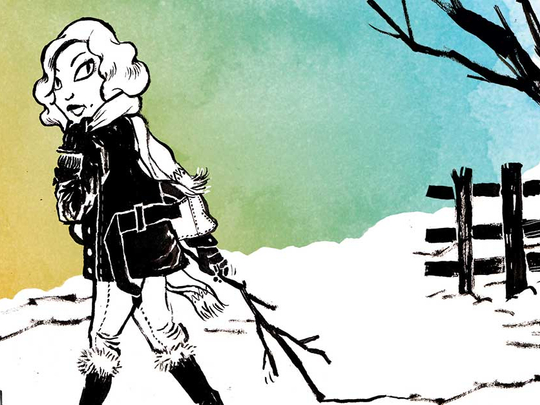
|
|
Homesick for Another World |
By Ottessa Moshfegh, Penguin Press, 294 pages, $26 |
A talented story writer can range an immense landscape — as Chekhov did in Russia — zeroing in on precise situations of intense isolation and, story by story, drawing what seems to be a map of national character. The bigger the country, the more necessary the short story form. In her excellent first collection, “Homesick for Another World,” Ottessa Moshfegh, the daughter of a Croatian mother and an Iranian father, moves from the West Coast to East Coast (with a brief stop in China) and homes in on characters in states of weirdly dynamic paralysis, trapped between the pains of the past — bad childhoods, bad relationships, bad marriages — and dreams of the future. If there’s a thematic thread weaving through this collection, it’s the complicated relationship between entrapment in the physical body — her characters are often probing, picking and searching with their fingertips, as if seeking beauty and potential grace — and entrapment in social landscapes.
The collection opens with “Bettering Myself”, a portrait of Miss Mooney, a 30-year-old divorced high school teacher at a Ukrainian Catholic school in the East Village, as she passes the days with her students and her college-age boyfriend, who lingers outside the story most of the time as a symbol of pure millennial angst. Her students’ lives are a mess, but her own life is even more of a disaster, and together they share snarky dialogue and mirrored despair. Nothing much seems to happen, as Miss Mooney describes her life — drinking too much and snorting cocaine, going out with her girlfriend, a pseudo-transgressive clubgoer: “Most evenings she bid me adieu on the arm of some no-face corporate type to show him ‘the time of his life’ back at his condo in Murray Hill or wherever those people lived.”
But “Bettering Myself” isn’t fuelled by plot, or by the threadbare concept of epiphany or a sense of some kind of “closure” (that poor, abused word). Instead, its pleasures derive from how it offers what Ezra Pound called “news that stays news” — a sensation of looking into a life and catching a glimpse of not only a particular character but also a particular emotional and social milieu. As Miss Mooney heads to church for what you assume is going to be some pivotal, symbolic moment, she stops at a McDonald’s for a Diet Coke and then decides which size she wants. “This felt like a great occasion,” she tells us. “I can’t explain it. I felt immediately endowed with great power. I plunked my straw in and sucked. It was good. It was the best thing I’d ever tasted.” When she finally gets to the church, it’s locked, so she heads to McSorley’s tavern, where the story ends with a faint resolution. It’s a risky move, but it works. We’re left with the quiet yet complex pathos of this woman as she sits at the bar, eating a bowl of pickled onions, and that’s enough.
Trying to describe a short story in a few lines is like trying to describe a bird in flight, or the elegance of a perfectly executed pirouette. Doing so can reduce something elegant and mysterious to a set of awkward instructions that betray the thing itself. A good story is a high-wire act that uses angle of vision, voice and plot to produce a work that somehow, against all odds, radiates meaning at all levels — in the sentences, the structure and in the absences. Each story in a collection has an aesthetic burden it has created for itself, and it must carry that burden properly. A few of Moshfegh’s stories don’t quite manage to do it; they stagger under their own weight. In “No Place for Good People,” the narrator, a widower, works in a home for adults with developmental disabilities. In a voice that seems to be channelling Raymond Carver, he leads us through his experiences with the patients and then laments the bitter years he spent with his wife. We feel his isolation, but we don’t feel the deeper mystery of why what happens to him should matter to us, to our sense of being human. In “A Better Place,” Moshfegh edges into the fantastical mode, creating the character of a young girl with a voice that strains verisimilitude. Too many questions lingered: How does this world work? Is the narrator simply making it all up as she goes along?
Still, even the few other stories that falter give us a sense of watching a fluent, deeply talented artist extend herself and take risks in her quest to master the form. At the centre of this collection are two magnificent examples of how a short story can become expansive beyond expectation. In “An Honest Woman,” a single “girl” in her early 30s lives next door to an eavesdropping old man. Moshfegh pulls the lens back slightly and tells the story from the old man’s point of view and then, with extreme subtlety, moves towards the woman’s point of view until the two characters form a nexus of potential violence that culminates in a dramatic episode, during a storm, in the old man’s living room. The story doesn’t end with an abrupt epiphany; it ends with a scene of the old man, days later, “ambling like a stray dog” through the streets of his town, and it radiates outward. In “The Beach Boy,” an older Manhattan couple return from an island getaway destabilised, carrying images, both photographic and mental, that include one of a male prostitute on the beach. The story begins as an elegantly precise portrait — in the mode of early Woody Allen — of a couple navigating the city, dinner parties and Central Park, as they also navigate the twilight of their relationship. With technical skill reminiscent of the late William Trevor, Moshfegh allows a major event to intrude unexpectedly, and the narrative deepens to reveal the enigmatic depths of the husband’s personality as he looks back on his life and flies back to the island.
In several stories set in California, Moshfegh writes with Didionesque precision of blinding white sunlight, of streets lined with dying palm trees and suffused with a dreamy anomie particular to Los Angeles. A young woman lives in a crumbling apartment with a paranoid boyfriend, a wannabe actor, who lurks and speaks like a demented slacker prophet. “There were people I could have called, of course,” she concedes. “It wasn’t like I was in prison. I could have walked to the park or the coffee shop or gone to the movies or church. I could have gone to get a cheap massage or my fortune told. But I didn’t feel like calling anyone or leaving the apartment complex. So I sat and watched my boyfriend clip his toenails.” In another story, a young man from Utah is looking for acting work, drifting through the LA landscape as only a newcomer can drift, and we chart his movements until, in Elysian Park, he “found a spot on a little cliff where I could listen to the cheers from the crowd and watch the traffic on the freeway, the mountains, the pale gray and sandy terrain.” Moshfegh’s California stories drop us into her characters’ lives and pull us out, leaving us alone to contemplate not only some particularity of our own lives but also the state of our culture, and even our times: “With all those ugly little streets in the ravine down below, LA looked like anywhere.”
In her extraordinary, impeccably dark and terrifying novel “Eileen”, which was shortlisted for the Man Booker Prize last year, Moshfegh fused the despairing voice of an older woman looking back at a tragic incident to a thrilling plot that takes the lyrical power of the short story and sustains it for a fantastic few hundred pages. Moshfegh quickly established herself as an important new voice in the literary world, and her concerns for those isolated not only in the margins of society but within the physical confines of the body itself mirrored the work of brilliant predecessors like Mary Gaitskill, Christine Schutt and, in some ways, Eileen Myles. “Homesick for Another World” continues that exploration but with a wider range, over a larger landscape. It’s a paradox that in order to locate a sense of national character — and that ever-elusive American dream — art must continually probe the places where that dream seems to have all but disappeared.
–New York Times News Service
David Means’s first novel, “Hystopia,” was longlisted for the Man Booker Prize.









